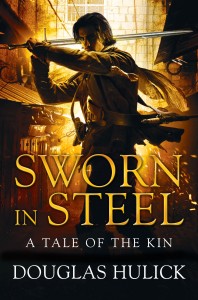
 Growing up, there were always books in the house, and Douglas was encouraged to read both through example, as well as by the general policy of the house, which was that the answer was never “No” when it came to getting more books. Toys, games, and so on could be “no”, but not books. You see where this is going, yes?
Growing up, there were always books in the house, and Douglas was encouraged to read both through example, as well as by the general policy of the house, which was that the answer was never “No” when it came to getting more books. Toys, games, and so on could be “no”, but not books. You see where this is going, yes?
Somewhere along the way, a copy of “A Dictionary of the Underworld” by Eric Partridge fell into Douglas’s hands. Having sold a few fantasy short stories, Douglas thought a book that defined historical thieves cant (criminal jargon) and described some of the practices of that world might come in handy at some point. Little did he know.
www.douglashulick.com
Sworn in Steel
Drothe has killed a legend, burned down part of the imperial capital, and unexpectedly elevated himself into the underworld’s elite. And as the city’s newest ‘Gray Prince’, Drothe’s learning just how good he used to have it.
With no time to build support, Drothe is already being called out by other Gray Princes. And when one dies, all signs point to Drothe. Members of the thieves’ guilds begin choosing sides, mostly against him, for what promises to be another gang war. Then Drothe is approached by someone who can solve all his problems and also offer him redemption. But the cost may be just too high. Out of options, Drothe’s finds himself travelling to the empire’s bitterest enemy. He has a price on his head, but one last plan in mind.
… and to give you a few insights into this year’s nominated authors, we’ve asked them all a few questions…
Tell us one of your early favourite fantasy novels?
I think my first major turn off the traditional fantasy highway (epitomized for me by Tolkein and Brooks) was when I discovered Robert E. Howard’s Conan stories (sitting on a shelf in our basement, of all places). Not just the characters and adventures, but the world he built around them with the Hyborian Age, really grabbed me. It was different than anything I’d read before, and is still with me in many ways today.
What fantasy novel was a real game changer, shifting the way you thought about epic fiction?
Roger Zelazny’s Chronicles of Amber (and specifically, Nine Princes in Amber). I’d long been a fan of hardboiled detective films and the like, so when I came across a novel where the story was presented in a first person point-of-view, had a noir-ish feel, and began with a mystery? It opened up a whole new way for me to see fantasy stories, both as a reader and prospective writer.
What do you like to see on fantasy novel cover art? What puts you off?
I started reading fantasy in the 1980s, so I’m a bit averse to covers involving dragons, people riding dragons, men brandishing swords in heroic poses (often against dragons), people riding through ominous forests, or bright primary fantasy colored clothing. As for what I like, a memorable and engaging image will always grab me, be it a person or a setting or even a well-conceived theme. Something striking as opposed to an easy variation of a cover we’ve all seen before.
What classic fantasy themes always get your interest on the cover or in the write up of a new book? Any pet hates?
I like a puzzle to solve more than a quest to follow or an evil to overcome, so any write up that lets me know the characters are going to have to use their heads, as well as their swords, is going to get my attention. As for peeves, well, if I never read another coming-of-age or Chosen One story, I’ll be a happy fellow.
What’s the next big thing you’d like to see in epic fantasy fiction?
Well done, believable and capable female protagonists. Especially in the epic arena, where the male protagonist tends to dominate even more. Understand, I’m not simply talking about the equivalent of a man in a dress here: I want female characters I believe in as people, who confront the challenges before them in a way that makes sense for them as characters. If we (and I include myself in this) can move away from the default when it comes to epic fantasy and include more diverse characters (in terms of gender, race, and identity), I think we will be a stronger genre in the end.
Douglas Hulick has been reading fantasy literature for almost as long as he can remember. He suspects his penchant for far-away lands of yore led, in part, to his studying Medieval History, then teaching European Historical Martial Arts. Douglas reads, writes and plays with a rapier in Minnesota, where he is often surprisingly tolerated by his wife (who also fences) and two sons (who do not).
